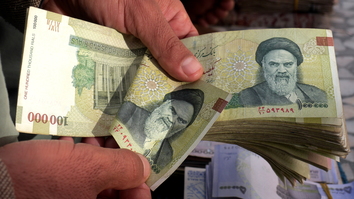HERAT -- In the middle of a bazaar in western Afghanistan, Arezo Akrimi takes out her smartphone and, after a few taps of the screen, exchanges some cryptocurrency for a bundle of hard cash.
Akrimi, 19, is one of 100 students in Herat receiving about $200 a month in cryptocurrency since September thanks to an American NGO, Code To Inspire.
This sum, which she converts at a currency exchange into afghanis, is crucial for paying rent and helping feed her family of six.
During the past seven months, Afghanistan's economy has virtually collapsed and the country is in the grip of a crisis caused by the freezing of billions of dollars of assets held abroad.
![Afghan money exchangers work at their office in Herat on February 15. [Wakil Kohsar/AFP]](/cnmi_st/images/2022/03/22/34629-000_324v43e-585_329.jpg)
Afghan money exchangers work at their office in Herat on February 15. [Wakil Kohsar/AFP]
![University student Arezo Akrimi (right) on February 15 exchanges cryptocurrency for cash at a currency exchange in Herat. [Wakil Kohsar/AFP]](/cnmi_st/images/2022/03/22/34630-000_324v438-585_329.jpg)
University student Arezo Akrimi (right) on February 15 exchanges cryptocurrency for cash at a currency exchange in Herat. [Wakil Kohsar/AFP]
![University student Arezo Akrimi (left) on February 15 buys groceries after exchanging her cryptocurrency for cash at a market in Herat. [Wakil Kohsar/AFP]](/cnmi_st/images/2022/03/22/34631-000_324v43h-585_329.jpg)
University student Arezo Akrimi (left) on February 15 buys groceries after exchanging her cryptocurrency for cash at a market in Herat. [Wakil Kohsar/AFP]
But digital currencies and their decentralised architecture, impervious to international sanctions, are allowing a handful of young Afghans to avoid the worst of the crisis.
"It was very surprising for me to learn that this could be used in Afghanistan," said Akrimi. "It was really helpful."
Code To Inspire was founded to teach computer programming to women and girls in Herat, but its hi-tech approach is now also helping students get funds in the economically deprived nation.
Bank transfers to Afghanistan are almost impossible currently.
But even those with money in a bank struggle to get it out -- individuals are limited to withdrawing the equivalent of $200 a week, and businesses $2,000.
Customers have to queue for hours even for those transactions.
Cryptocurrency transfers have allowed the NGO to circumvent these obstacles while ensuring that each donation reaches those who need it most, said founder Fereshteh Forough.
"Crypto is an incredible way to overcome all kinds of political and economic sanctions but also a tool that can change the lives of people living in an authoritarian regime," said Forough, an American whose parents fled Afghanistan in the 1980s.
To guarantee the financial security of the student recipients, the NGO avoids paying them in bitcoin, the best-known cryptocurrency but whose price regularly swings wildly.
Instead, it favours the BUSD, a so-called "stablecoin" whose price is backed by the dollar.
"One BUSD is $1," said Forough.
Crypto converts
Beyond this humanitarian initiative, cryptocurrencies are gaining other followers in Herat, according to currency dealer Hamidullah Temori.
He has seen an influx of new customers over the past six months, many of whom regularly come to convert crypto-assets sent by relatives from abroad into afghanis.
Cryptocurrency transfers to and from Afghanistan have increased by 80% since last August, he said.
Transfers are instantaneous and commissions are much lower than for transactions made through Western Union or hawala, the over-the-counter system traditionally favoured by Afghans.
In Kabul, Noor Ahmad Haidar has become a crypto convert by force of circumstance.
The young man, who started exporting saffron to the United States, Britain, Australia and Canada in early 2021, now has 90% of his orders paid for in bitcoin.
"I avoid going through the chaotic process of bank transfers," he said.
"Since August, it has really become the only option available, and the most convenient for me."
Its growing popularity in Afghanistan was noted by Chainalysis in its 2021 Global Cryptocurrency Adoption Index, which ranked the country 20th out of 154 countries for "grassroots take-up".
"We're at a time when there are more solutions that allow you to trade cryptocurrencies on your phone and more people understand what it is," said Kim Grauer, the firm's director of research.
Still, while momentum is growing, the volume of trading remains very low, she said, and will remain so because of the lack of internet access and high levels of illiteracy in Afghanistan.
'Willing to take risks'
But for those who can venture into this world, cryptocurrencies could be a lifeline.
Besides his studies, Ruholamin Haqshanas writes from Herat for India-based media specialising in new technologies.
Over the past seven months his salary, paid entirely in stablecoins, has allowed him to absorb the galloping inflation and the free fall of the afghani.
"The stablecoins offer a very good protection against the loss of value of the currency," said the 22-year-old student, who now earns more than his doctor father.
The young man is also trying to speculate on some of the more volatile cryptocurrencies, thanks to the advice of a WhatsApp group with 13,000 members in Herat.
Fellow student Parisa Rahamati earned $600 in February hedging on the price of decentralised currencies such as Ethereum and Avax -- a windfall she shared with her widowed and unemployed mother.
"You have to be willing to take risks," said the 22-year-old. "Crypto is 50/50... you can double your bet or go to zero."








According to a report, Pakistan benefited from the cryptocurrency market last year (2021) to PKR 98 billion ($604.5 million). The cryptocurrency market in Afghanistan has also grown significantly. Many of my friends have invested in this market and made good profits. Given that cryptocurrency prices are currently falling, I would advise friends not to sell any coins/tokens. In the long run, prices will continue to rise, and I recommend the friends who have recently become unemployed that now is a good time to invest in this market. I see some friends who have invested in OmegaPro. I read a lot about OmegaPro, but I didn't find anyone who would have lost in it. This means that the crypto market is a bit complicated and risky, so those who do not have experience in this field should know themselves before investing. And if you want to have a Passive Income, then OmegaPro is an excellent opportunity. Note: I haven't invested in OmegaPro myself, but I have been involved in cryptocurrency for two years. It is a very reliable and trustworthy market, and I have to say that you should know yourself well before investing in OmegaPro. I haven't seen any cases of people being cheated. with regards Asad Mubarez
Reply3 Comment
Since the Taliban took over power in Afghanistan, US sanctions, bankruptcies, cuts in foreign aid, and cash transfers have affected the Afghan economy. People are dealing with all kinds of problems in life. Some people have turned to using Bitcoin or digital money as a solution in this context. Proponents of cryptocurrency say digital money is the "money of the future" and reduces people's reliance on banks. People stand in queues to withdraw their money from banks, so it is a good alternative not to return home empty-handed and carry on their work on their mobile phones. Last year, Afghanistan was ranked 20th out of eight countries that use digital money, according to the findings of the digital company Chainalysis. But just a year ago, in 2020, the company underestimated the presence of digital currency in Afghanistan and even removed Afghanistan's name from the list. But the good thing is that Sanjar Afghan, an Afghan American, created the 'Hisabpay' application in 2019. This application helps Afghans to transfer money using cryptocurrencies. He says the "crypto revolution" in Afghanistan results from US sanctions against the Taliban and the Haqqani network, which are now in power. But it is gratifying that such a system has started working in Afghanistan, and people are using it. Other organizations should also start operating in Afghanistan at this time.
Reply3 Comment
It is gratifying that such a system has reached Afghanistan. Other institutions and banks should also help introduce cryptocurrency in Afghanistan.
Reply3 Comment